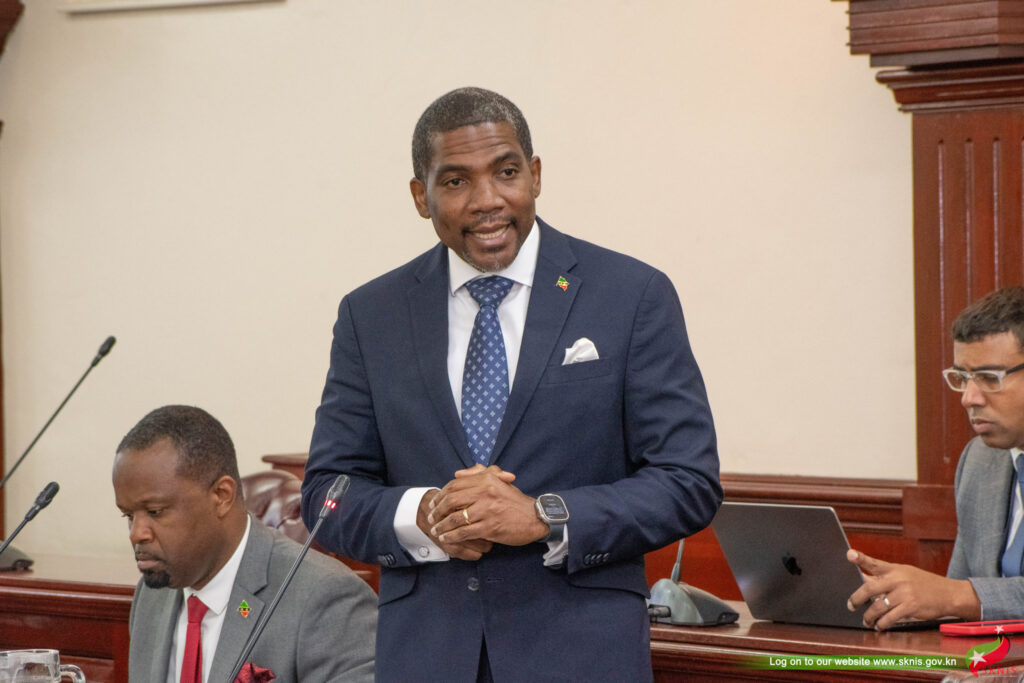BASSETERRE, Saint Kitts, July 24, 2025 (SKNIS) – Prime Minister and Minister of National Security, the Honourable Dr. Terrance Drew, delivered a powerful statement in the National Assembly today, July 24, 2025, as lawmakers debated and passed the Gang (Prohibition and Prevention) (Amendment) Bill, 2025, to further tackle the threat of gang violence in Saint Kitts and Nevis.
“For far too long, gangs have inflicted pain on our communities, stolen the futures of our youth, and shaken the sense of safety that every citizen deserves,” Prime Minister Drew stated, referencing findings from the USAID Criminal Dynamics Study which reveal that half of all homicides in the country are gang-related, and nearly all involve firearms.
The amendment today builds on the foundation of the original 2011 legislation introduced by the then Labour Administration, but goes further to meet the evolving trends of criminal organisations. As of 2023, police identified 15 gangs and 323 members, heavily concentrated in the Basseterre and Cayon communities, with concerning infiltration among secondary school students, six percent of whom self-identified as current or former gang members.
The Bill strengthens the existing legal framework by expanding definitions, increasing penalties, introducing new offences, and clarifying procedures to combat gang-related crime. It raises penalties to align with the amended Firearms Act, with fines of up to EC$250,000 and imprisonment of up to 30 years for forming or encouraging gang membership, and up to EC$500,000 and 40 years for gang leadership, participation in gang-related criminal activity, or being a gang-affiliated law enforcement officer. The definition of “gang-related activity” now includes planning, aiding, abetting, conspiracy, online promotion, and obstruction of justice, while new terms such as “firearm,” “offensive weapon,” and “retaliatory action”—which capture acts like threats, property damage, and cyber harassment—are also introduced.
New offences under the Bill include impersonating a law enforcement officer and retaliating against those cooperating with authorities or leaving a gang. The evidentiary framework has been expanded to allow courts to consider a wider range of evidence, such as self-admissions, affiliations, and statements made on behalf of a gang. Additionally, the Bill broadens the High Court’s jurisdiction and permits the treatment of minors as adults in serious gang-related offences.
While the Bill introduces firm legal consequences, Prime Minister Drew emphasised that its intent is also preventative and rehabilitative.
“This Bill supports both goals: deterring those who commit violence, and protecting and redeeming those who can still be saved,” Dr. Drew stated.
The prime minister highlighted ongoing national initiatives such as the ELEVATE Programme, the Explorers Clubs, and school-based outreach activities aimed at diverting youth from gang life and promoting positive alternatives.
In a heartfelt appeal, Prime Minister Drew addressed the nation’s youth directly, stating, “You are more than your neighbourhood, more than the mistakes of those around you. There is another path. The government is here to support you with education, training, and a second chance. The gun is not your only option.”
The Gang (Prohibition and Prevention) (Amendment) Bill, 2025, forms a key part of the government’s comprehensive strategy to combat violent crime, and ensure that all citizens can live in safety, security, and with dignity.
-30-



